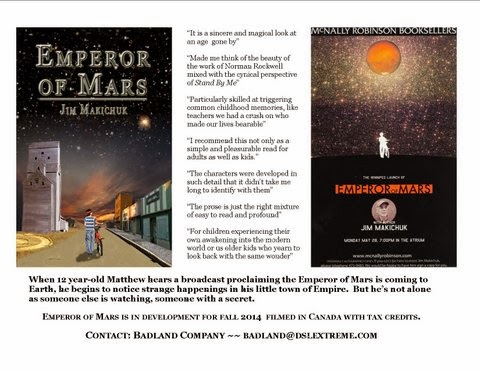Some of you already know my take on reader's reports, they're the reports that will judge my or your screenplays as to whether it goes upstairs or down to the trash bin. The job carries a tremendous amount of power, the reader judges your screenplay based on his/her own standards, likes and dislikes.
Going back to my screenplay The President's Heart, I had this readers report;
The premise of a presidential heart transplant is strong and commercial. It takes a personal need with a ticking clock, and transforms into a global crisis with a journey at its center. It's a smart base for an affordable political thriller which still has worldwide stakes. Making the protagonist a doctor was an intelligent decision, and introduces a fish out of water element that always plays well in a thriller. The setting - a chase from Paris to Luxembourg - is perfectly commercial.
Well, that sounds good. Who wouldn't want this review.
But... he/she added some criticism as well --
Too much of the plot
is under-explained or outright implausible. The signing of the papers to pass
the presidency is not established as necessary, and is a false drama - its
failure has no consequences. Additionally, it's not realistic that the speaker
is taking the presidency. It's not possible through the means suggested
(impeachment doesn't remove a person from office, is exceptionally slow, and is
only an accusation of a crime). The lack of believable usurpation seriously
undermines the stakes. There are many small plausibility issues. E.g.: why
would a random doctor be drafted for such a critical mission, why would the
terrorists have a satellite link to the heart. NOTE: The terrorists weren't terrorists, the word is never used, and they do not have a link to the President's heart, so much for the reader's attention span) how could world governments be
totally incapable of securing the heart, and why wouldn't Ulani kill Doc and
Judy.
And while the reader makes some okay points, but then goes a little bit further as in "the lack of believable usurpation seriously undermines the stakes. There are many small plausability issues, why would a doctor be drafted for such a critical mission, etc."
Why? Because I wrote it that way.
I could have written it as a cop, an accountant, a CIA operative and many other jobs. But I chose a doctor, and for a reason. Plausability is a tough issue, I like apple pie, you like blueberry pie. I happen to think there is believable usurpation and after all it's my story and I'll usurp as much as I want to.
Is the reader right or wrong? There are several other errors in the reader's notes that suggest the reader hasn't really read the screenplay twice and missed critical areas.
When you write a screenplay you probably will use something that someone else will say it's implausible. Take this for instance.
Liam Neeson's new movie opens today and will do great business, it's called Non-Stop and is about someone who's going to kill one person on the jetliner in twenty minutes.
Is that plausible?
Here's two reviews today, one from the LA Weekly and the other from LA Times. I'll just give an edited version that's relative.
LA Weekly said this: "if this were a real-life flight it would incite instant panic among the passengers" and "By the end of Non-Stop, we've been asked to buy wholesale about 2000 things that could never, ever happen in the world the filmmakers and we actually live in" and this; "this atrocity of a screenplay is credited to (three writers)."
LA Times said this: "effectively directed by Jaume Collet-Sera, is a crisp, efficient thriller that benefits greatly from the intangibles Neeson can be counted on to supply," and how about this; "As cannily put together by screenwriters (3 writers) Non-Stop's plot combines two classic mystery devices."
And finally my favorite line; Obviously those seeking iron-clad plausability should look elsewhere."
Sound familiar?
Have a great weekend, it's raining like hell in Sherman Oaks.

.jpg)











